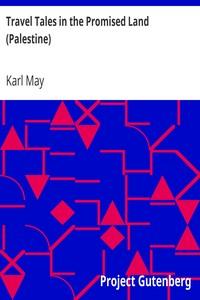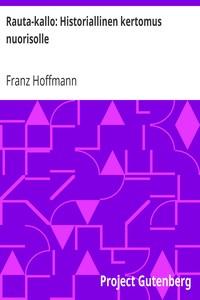|
|
Read this ebook for free! No credit card needed, absolutely nothing to pay.Words: 34653 in 7 pages
This is an ebook sharing website. You can read the uploaded ebooks for free here. No credit cards needed, nothing to pay. If you want to own a digital copy of the ebook, or want to read offline with your favorite ebook-reader, then you can choose to buy and download the ebook.

: Travel Tales in the Promised Land (Palestine) by May Karl Schoonover James D Translator - Middle East Description and travel Travel@FreeBooksWed 07 Jun, 2023 Translation copyright 2008 by James D. Schoonover. German Novelist Karl May's 1907/1908, Schamah Travel Tales in the Promised Land Translator: James D. Schoonover, MA, M.Ed., c. 2008, USA Schamah, Reiseerzaehlung aus dem Gelobten Lande, von Karl May c.1907/1908) As soon as they step into my house and see my strange collection of travel keepsakes, all visitors' eyes are drawn to the Arabian saddle, which actually deserves credit as the inspiration and author of this story. It has Oriental-red velvet, richly decorated with gold embroidery. This Pasha saddle was fit for a tribal Turkish chieftain, having comfortable stirrups and an accompanying dreadful bit that could conquer the stubborn resistance of even the mightiest horse. My magnificent saddle was a present from Mustafa Bustani, a wealthy merchant and friend who worked equally well with Arabs and Jews. His shop is on the right hand side of the Marketplace El Bizar, along the way to the third most sacred Islamic mosque, Harem Esh Sheriff, where the Israelite King Solomon's Temple earlier stood. Try to understand the nature of Judaraber, these Arabs of the Holy Land who now live side-by-side with Jews. Little by little, they have given up their handed down-hatred against Hebrews, for they share the strict Old Testament views of "God's Chosen People." In this way, Judaraber are more inclined to think like Semites and less like those in Christendom. With these Muslims, it is no more of a disgrace to become a Christian as to convert to Judaism. Anyway, this unique perspective only concerns inner opinions; especially regarding personal matters or simple business transactions, this peculiar outlook has hardly any influence. So, I was Mustafa Bustanis' friend, in spite of religious differences, just because we liked each other. When I bought things in Jerusalem, I purchased solely from him whenever possible. I preferred to deal with him, not only as a merchant, but much more as a good human being. He too knew this truth, and he repaid me through our friendship's deep affection. I felt that I possessed his complete trust and confidence. I often stopped by his store, even if I had no particular reason to buy something. For many hours, we sat beside each other, reclining against a broad, Persian carpet-covered crate as we endlessly drank coffee that his African servant Bem prepared for us. We considered ourselves to be like brothers; thereto, we felt no need to keep secrets from each other. Every now and then, there were distinguished customers that he permitted to interrupt us. His assistant attended to them, even though he himself could have waited on them. Habakek was the name of Mustafa's helper, an exceptionally good-natured fellow-a delightful combination of magician, jack-of- all-trades, and Renaissance man who could accomplish anything that your eyes could imagine. Mustafa Bustani was a big fan of fairy tales. He loved to hear or tell every kind of fairy tale-most of all, one which involved a belief in miracles or a situation wherein the dead and the living played a dynamic role. Yet in no way was he superstitious in the general sense. On the contrary, he was an educated man who spoke Arabic, Turkish, and Persian; with Westerners, he could reasonably communicate in French and in English. Concerning religious faith, he showed commendable tolerance; however, earlier in life it was the opposite case. He had a brother who was banished from the family, due to the fact that he had been baptized as a Christian. Mustafa did not conceal this fact; at the time, he had totally agreed with his exile. In contrast to the past, he now seemed to think otherwise about that banishment. In truth, I learned nothing more than that his brother had moved to East Jordan; there he had married a Christian woman. For that reason, all of the banned brother's attempts at reconciliation had been rejected. Thereafter, he vanished-yet, one knows all too well that family ties can never be completely ripped apart. When my friend spoke of his "harem," he was using the Semitic culture's exclusive, figurative reference to the soul's most private and sacred sanctum. Therein, he seemed to be inspired by more compassionate convictions which he had not yet succeeded in shutting out. Harem? Yes, be certain that our mutually respectful confidence in each other had risen so high that we quite often did not avoid speaking of his or my "harem." Among Muslims, this open interchange is actually forbidden. Namely, only my wife was permitted to understand my most private sphere of thoughts, to know my "harem." I have no children. As for Mustafa's spiritually-reserved harem, he confided in his wife, his eleven year old son, and in the family's black female cook. The other household servants were not included in this private circle of confidants. His son had the short, yet very meaningful name of Thar, which Bavarians would interpret as a "dashing fellow." Unlike the stereotypical, mistaken picture of Middle Eastern children, he was not a somber, moody, overly serious, nor slow-moving child. From the family's home which lay outside the inner city, this delightfully mischievous boy often came to his father's store. Whenever he met me, it seemed that he never tired of tossing me the most unbelievable heaps of questions about all kinds of matters concerning my homeland. From him, I learned the latest news about his father's harem-every broken pot and every captured mouse. In return for his youthful openness and his high regard for me, he expected me to report all of my secrets to him. Woe unto me if he ever believed that I failed to trust him in this relationship. In the course of this friendly bond among father, son, and myself, I was invited as a guest and had the opportunity to meet the mother. I remember this well. I often spent entire evenings in the home of Mustafa Bustani. When I last said good-bye, I promised to bring along my wife on my next visit. Free books android app tbrJar TBR JAR Read Free books online gutenberg More posts by @FreeBooks

: The Pretty Sister Of José 1889 by Burnett Frances Hodgson Reinhart Charles Stanley Illustrator - Spain Social life and customs 19th century Fiction@FreeBooksWed 07 Jun, 2023
|
Terms of Use Stock Market News! © gutenberg.org.in2025 All Rights reserved.






